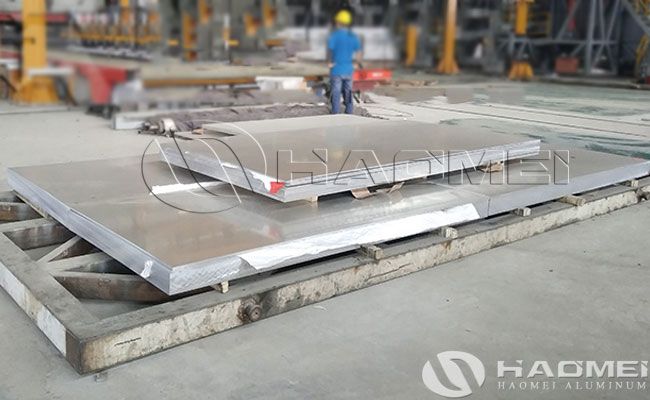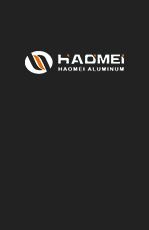DNV Certified Marine Aluminum Sheet
DNV certified marine aluminum sheet refers to aluminum alloy sheet certified by Det Norske Veritas (DNV) and meeting relevant standards such as its ship classification rules. It can be used in shipbuilding and marine engineering.

Main DNV certified aluminium sheet grades include 5-series and 6-series aluminum alloys.
- 5000 series aluminum alloys:
In addition to the previously mentioned 5052, 5083, 5086, 5059, 5456, 5383 and so on. Mainly magnesium as alloy element, it has excellent corrosion resistance, high strength and good welding performance. They are often used in ship structures requiring extremely high corrosion resistance and strength, such as critical load-bearing components and bottom plating exposed to prolonged seawater immersion.
- 6000 series aluminum alloys:
Examples include 6061, 6063, and 6082. 6000 series aluminum alloys are aluminum-magnesium-silicon alloys with excellent heat-treatment hardening properties. 6061 aluminum alloy contains 1.0%-1.5% magnesium and 0.4%-0.8% silicon. It offers high strength and hardness, and good processability. It is often used in ship components requiring high strength and good processability, such as stair railings, handrails, and some machined parts. 6082 aluminum alloy has a relatively high silicon content of 0.7%-1.3%, and also offers excellent weldability and corrosion resistance, making it suitable for ship frame structures.
Specifications of DNV certified marine aluminum sheet:
- Thickness:
Typically ranges from 3mm to 150mm, but can be thinner or thicker depending on specific needs. For example, interior panels or non-critical structural components of small ships may use 3mm-6mm thick aluminum plates, while critical areas such as the hull and deck of large ships may use 20mm-50mm or even thicker aluminum plates.
- Width:
Common widths range from 1000mm to 3000mm, with some special specifications available up to 3500mm or even wider to meet the dimensional requirements of different parts in ship construction, reduce weld seams, and improve structural integrity and reliability.
- Length:
Customizable to customer specifications, common lengths range from 2000mm to 12000mm. For example, when constructing a ship deck, aluminum plates can be tailored to the specific dimensions, reducing material waste and processing workload.
DNV certified marine aluminum sheets offer excellent performance. For example, the common 5083 marine aluminum sheet has the following properties:
Mechanical Properties:
O/H111/H112 Temper: Tensile strength ≥ 275MPa, yield strength ≥ 125MPa, elongation ≥ 16%.
H116 Temper: Tensile strength ≥ 305MPa, yield strength ≥ 215MPa, elongation ≥ 10%.
H321 Temper: Tensile strength 305-385 MPa, yield strength 215-295 MPa, elongation ≥12%.
Advantages of DNV certified marine aluminium sheet:
- Strong Corrosion Resistance:
Take 5083 aluminum alloy as an example. The magnesium contained in it forms a dense oxide film on the aluminum plate surface, effectively preventing corrosion from seawater, salt, and other factors. After long-term use in marine environments, the corrosion rate of 5083 aluminum plate is very low, far lower than that of ordinary steel, significantly extending the service life of ship structures.
- Excellent Mechanical Properties:
Through appropriate processing and heat treatment, 5000 series and 6000 series aluminum alloys can achieve an excellent balance of strength and toughness. For example, 5083-H116 aluminum plate has a tensile strength ≥270 MPa, a yield strength ≥125 MPa, and an elongation ≥10%. This strength level can meet the various loads a ship must withstand during navigation, including the impact of waves, the weight of the ship itself, and the weight of cargo. At the same time, the excellent toughness makes DNV approved aluminum plates less susceptible to cracking when impacted, enhancing the safety of ship structures.
- Excellent Weldability:
5000 series and 6000 series aluminum alloys offer excellent weldability. During shipbuilding, using methods such as MIG and TIG welding, the weld joints are of high quality, with weld strength exceeding 80% of the parent material's strength. Furthermore, these aluminum alloys are less susceptible to defects such as cracks during welding, making the welding process relatively simple, thus improving the efficiency and quality of shipbuilding.
- Lightweight:
The density of aluminum is approximately 2.7g/cm³, only about one-third the density of steel. Using marine aluminum plates can significantly reduce a ship's deadweight. For large ships, reducing hull weight reduces drag and, consequently, fuel consumption. Statistics show that for every 10% reduction in ship deadweight, fuel consumption can be reduced by 8%-10%, which is crucial for controlling operating costs and improving environmental performance.
- Good Machinability:
Marine aluminum sheet has excellent plasticity and machinability. Through a variety of processing techniques, such as rolling, extrusion, bending, and stamping, it can be formed into components of various shapes and sizes to meet the complex structural design requirements of shipbuilding. For example, aluminum sheet can be bent into curved shapes for use in ship hulls, such as bows and sterns.
Applications of DNV certified marine aluminum sheet:
- Shipbuilding:
In shipbuilding, marine aluminum sheet is widely used in hulls, decks, bulkheads, and other areas. For the hulls of large ships, the use of aluminum sheet such as 5083 ensures strength and corrosion resistance while reducing weight. In ship interiors, aluminum sheet can be used in bulkheads to separate different compartments, and due to its light weight, it does not add excessive load to the hull. Furthermore, aluminum sheet can be used in the exterior and interior cladding of ship superstructures, such as the wheelhouse and crew quarters, providing excellent aesthetics and comfort.
- Offshore Platforms:
On offshore oil drilling platforms, DNV-certified marine aluminum sheet can be used for support structures in drilling modules, as well as floors and walls in the living quarters. Offshore platforms are exposed to harsh marine environments for extended periods, placing extremely high demands on corrosion resistance and strength. Marine grade aluminum sheet effectively meets these requirements. For example, 5083 aluminum sheet can be used in the construction of offshore platform piers, connecting the platform structure to other facilities and ensuring stability and safety under the influence of waves and wind.
- Other Applications:
In the liquefied natural gas (LNG) transportation sector, DNV-certified marine-grade aluminum sheet can be used to manufacture the hulls and internal structural components of LNG tankers. Since LNG storage and transportation require low-temperature environments, the low-temperature toughness and corrosion resistance of marine-grade aluminum sheet make it an ideal material choice. Furthermore, marine-grade aluminum sheet can be used in some coastal bridge construction, particularly in sections close to the sea, leveraging its corrosion resistance to extend the bridge's service life.








